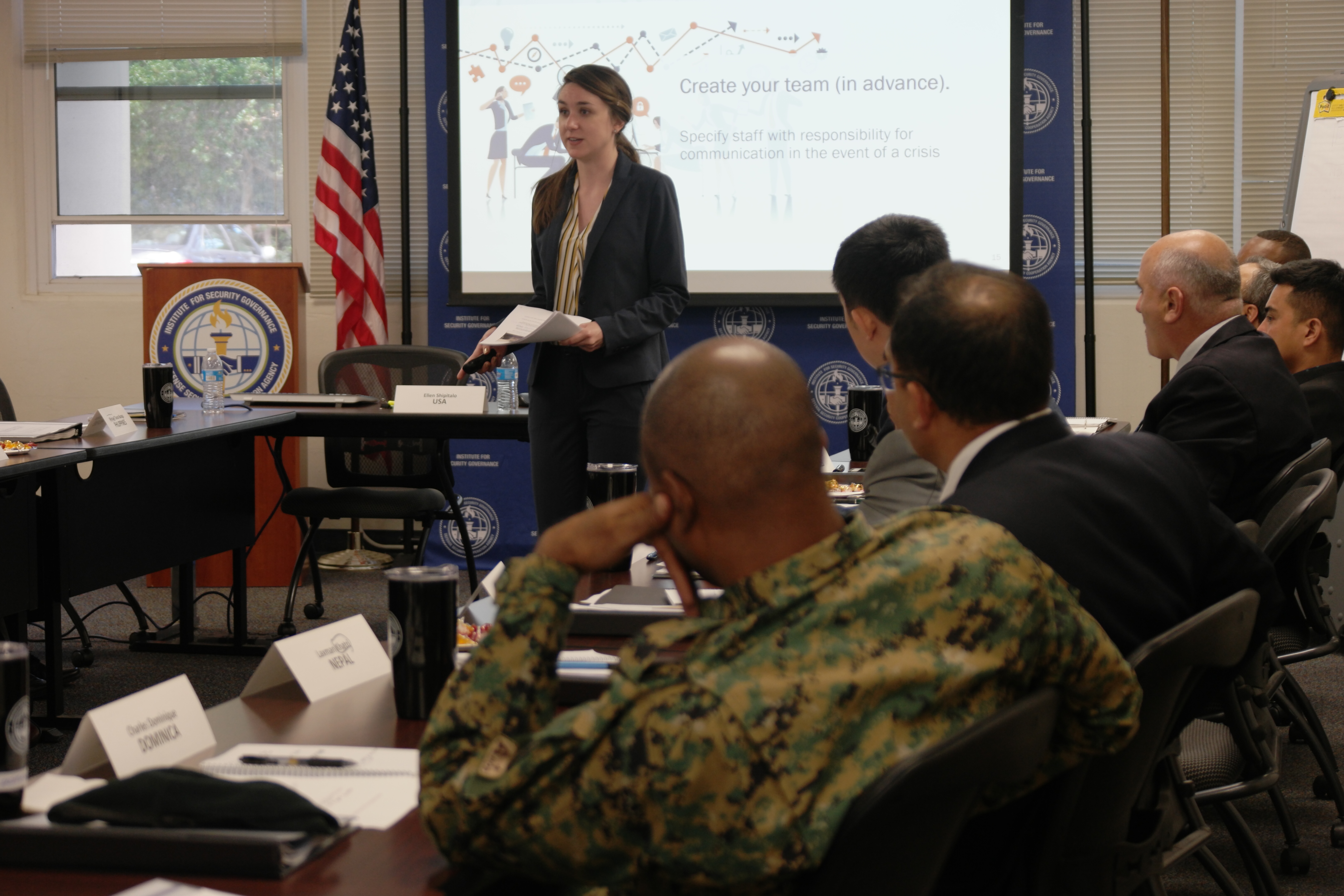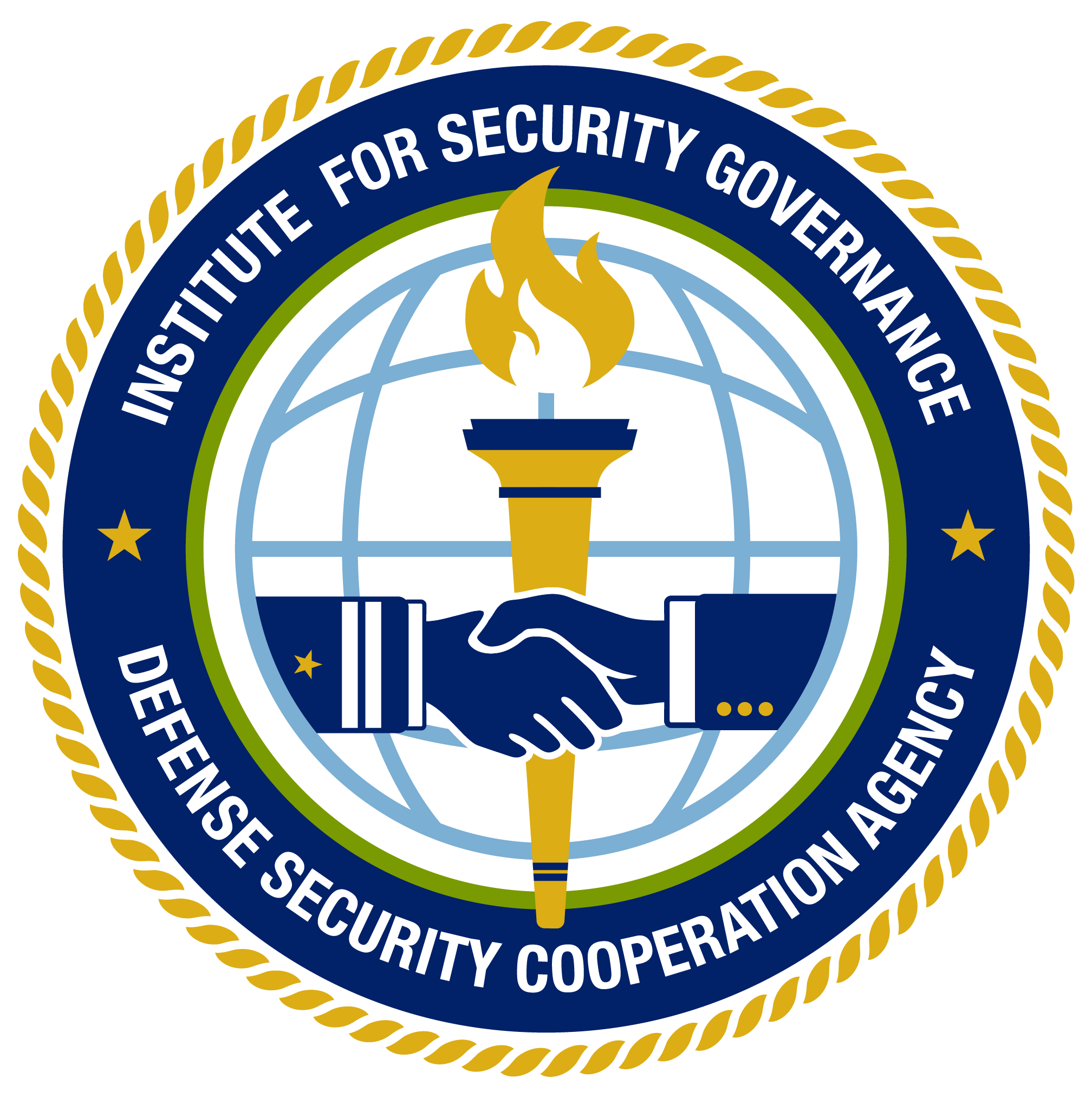Continuation, Collaboration, and Reinvention: ISG in the Wake of COVID-19 - Defense Security Cooperation University

2020: Quarter 4 - Jul 31, 2020
Continuation, Collaboration, and Reinvention: ISG in the Wake of COVID-19
By Eva Lanot , Faculty Associate, Peace & Security Division
We’ve all been there: try as you might to get to the airport on time, traffic is backed up and-- sweaty, stressed, and deflated—you miss your flight. But few have been in the situation where that flight is the last one departing for your home country before borders are closed in response to a global pandemic. “We were in the middle of a three-course [six-week] series when the seriousness of COVID-19 hit,” recalls Institute for Security Governance (ISG) ‘Principles of Defense Procurement and Contracting’ course director and faculty member, Samantha Schwellenbach. “This was when the policy document stating that travelers from or transiting through most of Europe must go on homestay status immediately.” The guidance affected half of the twenty-three international military and civilian students (IMS) attending Samantha’s March resident course at ISG headquarters in Monterey, California.
We were in the middle of a three-course [six-week] series when the seriousness of COVID-19 hit.
In addition to navigating the ins-and-outs of homestays and pivoting mid-course to teaching using a hybrid format, Samantha and a core group of colleagues “were in constant contact with US embassy teams who were recalling students; wanting to get those students home before their borders closed.” Nearly one-hundred thirty days after his course ended, in what was an undoubtedly a meaningful reunion, the student who missed his flight in March returned home to his family.
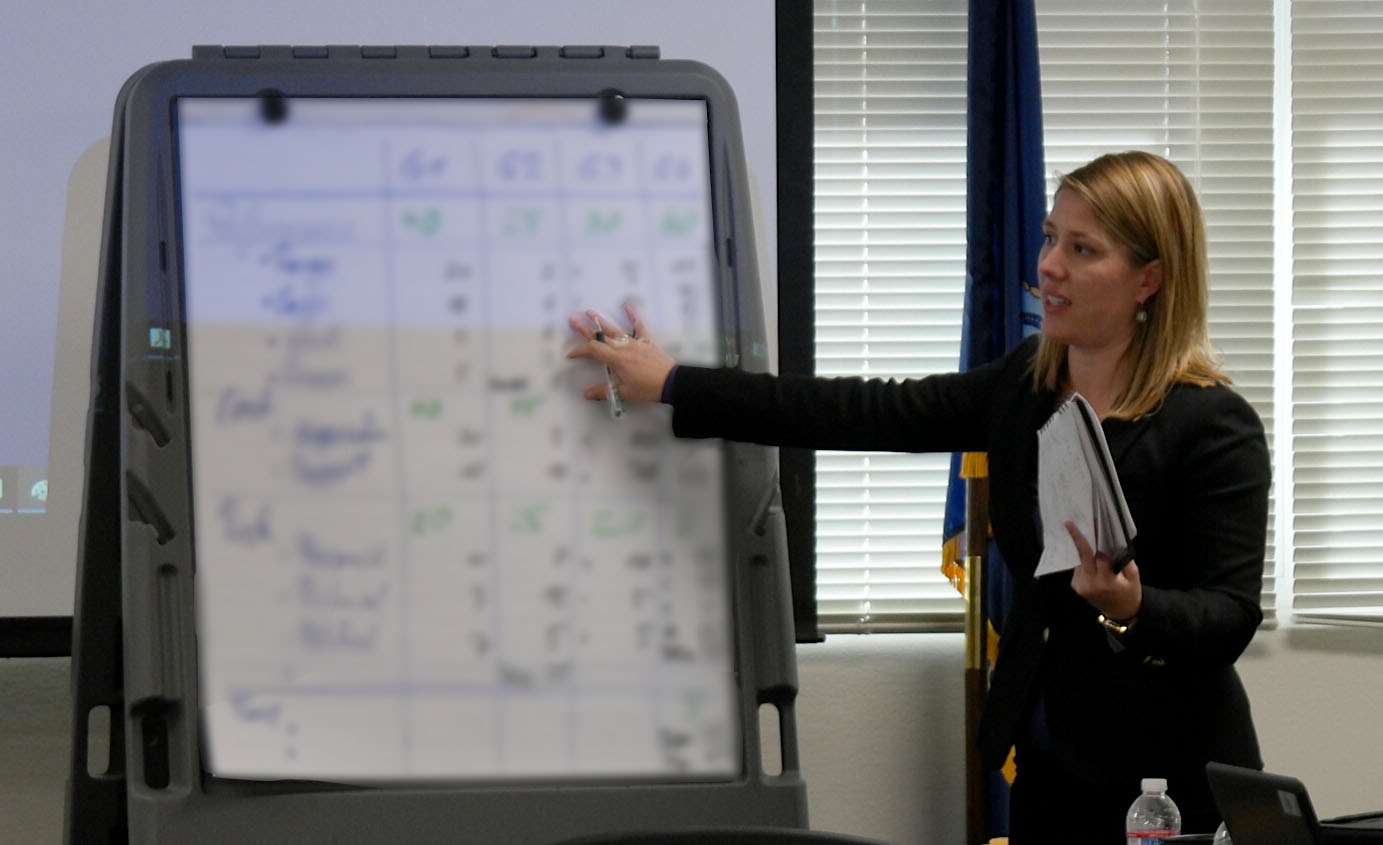
Also contending with the impact of COVID-19 travel restrictions is ISG’s Advising and Consulting (A&C) team. With Institutional Capacity Building (ICB) projects spanning more than one-quarter of the world’s countries, ISG’s advising work regularly demands in-person meetings in ISG’s partner countries. Efforts are often long-term, with team composition and project approaches tailored to address unique partner institutional capacity building (ICB) problem sets.
Project continuity and relationships are critical to [the] success of ICB projects.
ISG’s A&C team principal, Lindsay Fritz, affirms that “Project continuity and relationships are critical to [the] success” of ICB projects. Recalling early March when COVID-19 restrictions became a working reality, an advising team Western Hemisphere Regional Program Lead (RPL) echoes Lindsay’s statement. Paramount to him “was how to ensure that [our team] demonstrated a commitment to the partner.”
Worsening conditions attributable to the pandemic did cause a few partners to request temporary stays in project activities. However, through virtual collaboration, most ICB advising efforts are continuing at their previous pace. For these ongoing activities, the advising team is incorporating a range of enhancements to the virtual environment. These include the use of sequential interpretation and introduction of online visual planning tools. One RPL notes that, with these enhancements, some partner-nation personnel “seem to have embraced the [virtual] approach” to ICB.
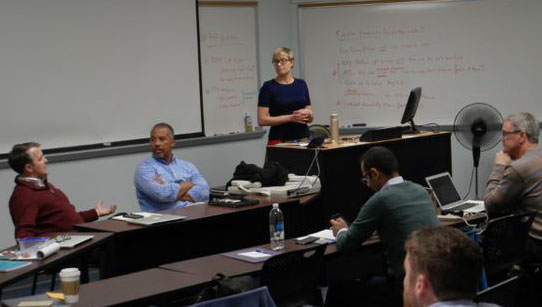
Capitalizing on these enhancements, in May, Europe RPL Gary Espinas and his project partners launched and concluded two virtual workshops that served as the capstone of fifteen months of collaborative work. This important partnership managed to produce, approve, and release a key strategy document for a partner-nation Air Force. In Gary’s words, the first-of-its-kind document “outlines future development of the Service until 2035.” In late July, Indo-Pacific RPL Erik Leklem “completed a virtual ‘strategy implementation’ workshop” that was attended by 20 participants from across the partner nation’s security sector. The workshop series emphasized four priority areas for the specific partner’s Ministry of Defense. According to Erik, “The workshop was held over five days, and included human centered design workshop sessions and intelligence-oriented case studies.” He further explains that workshops like this one are examples of “how ISG can both adapt and innovate in our mission of advising on [Institutional Capacity Building] ICB.”
Strengthening ICB and partnering efforts is the domain of all ISG teams, not in the least that of Innovation and Learning (I&L). During this unique moment where COVID-19 has moderated ISG’s efforts, partnership lead and resource planner Linwood Ham has accepted another duty. His task? To build an intra-institutional “tiger team” charged with originating and developing ICB products that support and advance approaches for ISG and select security cooperation (SC) community partners. Linwood explains that the tiger team’s charge is to take what “we know as a matter of course” through being ICB practitioners and convert that knowledge “into something that we can say in a very crisp and direct way.” A specific example is the ongoing development of products speaking to ISG’s work and approach in the realms of Maritime Security, Logistics, Cyber, and Defense Acquisition from an ICB-specific angle. These products represent a new tool in the ISG toolkit, designed to support and enable the security cooperation community in the ICB field.
While the post-March 2020 working environment comes with tangible hardships, Linwood allows that it has also afforded ISG “the opportunity to think about how we would produce such a product; how ISG would operate in an integrated fashion in the production of this product; and the ways in which we may share and disseminate the product.” Though still in the R&D phase, Linwood affirms that the process the tiger team is going through is “refin[ing] and reinforc[ing] our ability to work well intra-institutionally.” Regular team members include representatives from across ISG’s five divisions, who are increasingly sharing ideas and working together in new and productive ways. This effort also relies on the contributions of ISG faculty outside of the tiger team with topical expertise. With a strong, but small faculty team at ISG, admittedly, sometimes the two overlap.
ISG’s focus on evolving ICB approaches reflects broader efforts by the US Department of Defense (DoD) to look anew at the policy and practice of SC. As the Defense Security Cooperation Agency’s (DSCA’s) leading ICB institute and a primary implementer, ISG has a central role in this larger DoD effort. Jeanne Giraldo, ISG’s assessment, design, monitoring and evaluation lead, explains that the I&L team is the part of ISG that is tasked with driving change and “supporting new requirements and challenges.” Changes to SC law, policy, and procedures in the last several years have meant significant adjustments to how DoD plans. Jeanne identified that the “need for better planning has introduced the complimentary need for new frameworks.” DSCA, ISG’s parent organization, has responded to this need by refining its processes for the assessment, monitoring, and evaluation of SC activities. “After working so many years with partners on changing their systems and processes, now we are living our own change management process,” reflects Jeanne.
For the first time there is a shared vocabulary of roles and capabilities, a shared framework of understanding institutional capacity building, and a shared requirement, now, to do ICB assessment, monitoring and evaluation.
Rather than slowing down since COVID-19 hit in March, I&L and other members of the ICB and SC communities have been focused on ICB analysis, planning and requirements development. ISG and its colleagues – including DSCA’s ICB Division, the Defense Institute of International Legal Studies, along with critical SC stakeholders from the Global Combatant Commands and the Office of the Under Secretary of Defense for Policy – have been actively engaged in an intensive, first of its kind resource and requirements review. This has taken the form of twelve virtual events that support leadership by reviewing requirements, setting priorities, and determining resourcing.
Jeanne noted that for ISG, pauses in some other work caused by COVID-19 created space to focus on this type of planning and review in greater detail than ever before. In addition, a broader group of ICB and SC personnel have been able to participate in a virtual environment, enabling the community in “getting on the same sheet of music.” Moreover, as Jeanne points out, it signifies that “there is a shared vocabulary of roles and capabilities, a shared framework of understanding institutional capacity building, and a shared requirement, now, to do ICB assessment, monitoring and evaluation” in a more comprehensive way. This represents a significant evolution in what ICB looks like in this new era.
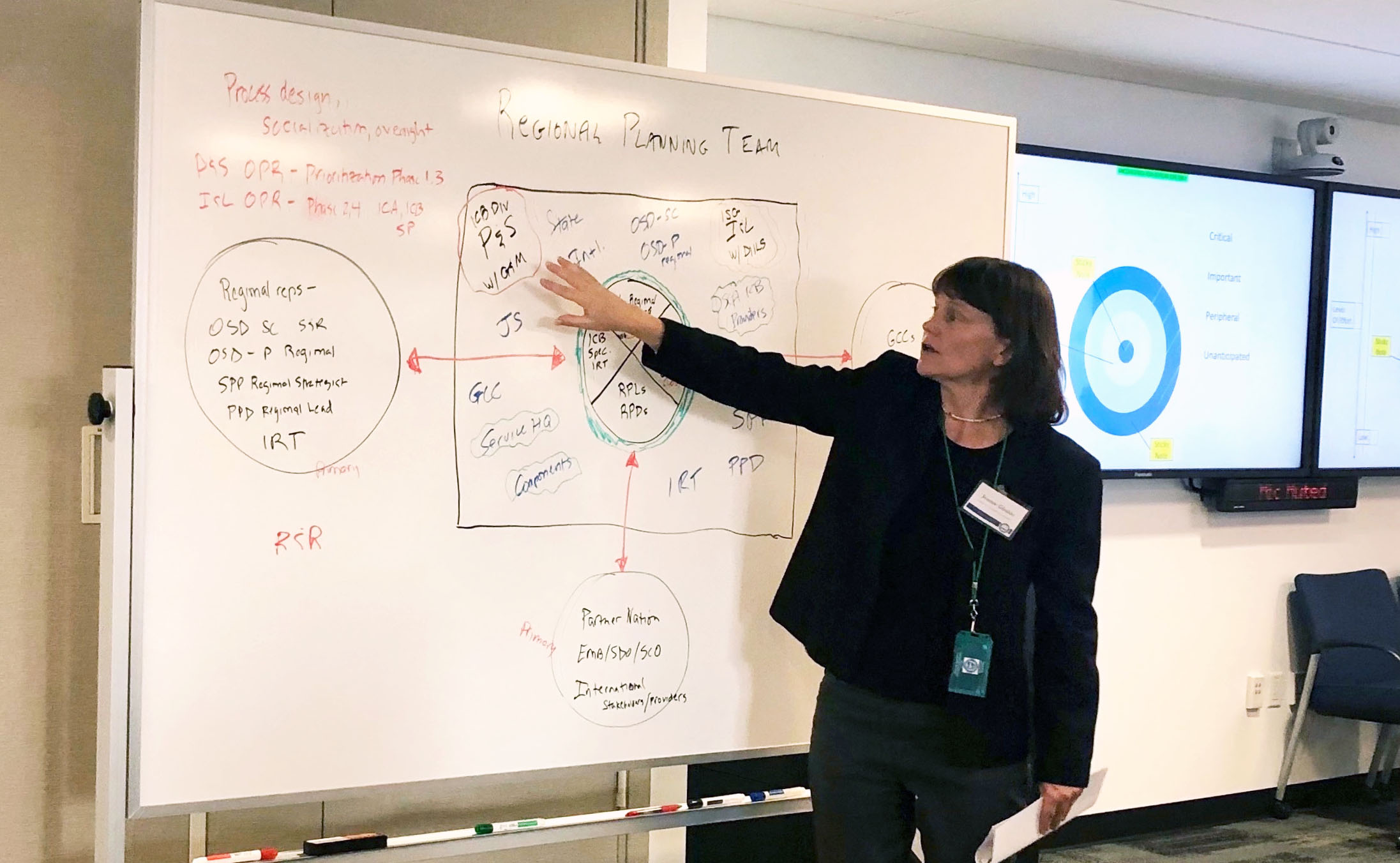
Also adapted to reflect current circumstances was the approach to this year’s Security Cooperation Education and Training Working Groups (SCETWGs). These annual springtime working groups are usually convened in person, but were held virtually this year. According to Samantha Schwellenbach, SCETWGs “are an opportunity to facilitate coordination between US Offices of Defense Cooperation training program managers, and the various organizations, training agencies, and schoolhouses involved in security cooperation activities.” This includes planning for the delivery of mobile offerings, including ISG’s mobile engagement efforts, but it is also pivotal for securing enrollment in ISG’s upcoming resident courses.
Though on mandatory telework, teaching faculty from both the Education and Professional Practice (E&PP) and Peace and Security (P&S) teams met virtually to reimagine ISG’s resident course schedule for the coming year and, separately, to explore distributed learning opportunities.
As a DoD schoolhouse, ISG runs nearly thirty resident courses and attracts hundreds of international civilian and military students to its home in Monterey, California, annually. Responding to the threat posed by COVID-19 and coinciding declaration of a state of emergency in California, ISG made the difficult decision to cancel its resident courses until October 2020. In addition, ISG upended its traditional model of standalone, two-week resident offerings. Though on mandatory telework, teaching faculty from both the Education and Professional Practice (E&PP) and Peace and Security (P&S) teams met virtually to reimagine ISG’s resident course schedule for the coming year and, separately, to explore distributed learning opportunities.
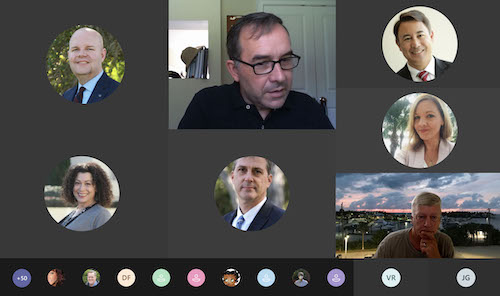
By June 1, and in a testament to the quality of faculty collaboration, ISG leadership approved a fully-retooled fiscal year 2021 (FY21) course calendar. This fresh schedule is made up of either newly-minted month-long courses or at least two back-to-back, two-week long existing courses. The first two resident activities in FY21 have already achieved maximum enrollment. As for its new, month-long courses, ISG will stand up Strategies and Capabilities for Cyber Challenges (P179898); Strategy, Capability, and Multi-dimensional Threats (P179896); and Securing the State: Building Institutions for National Security (P179897) beginning in quarter three of FY21.
However, returning to the classroom safely requires ample preparation and jockeying to secure the resources to do things right and do right by ISG’s students. Which is why ISG combating terrorism program lead, Matthew King, along with a cadre of inter-divisional faculty and staff, have established a course-restart taskforce. With the taskforce as its guide, ISG is planning carefully behind Center for Disease Control, State of California, and Monterey County Health regulations.
We’ll have to do it differently, but we still have to do it well.
Reflecting on possible impacts to social and learning interactions inside and outside the classroom as an outcome of COVID-19, Matthew comments, “The conversations that take place over a meal, over cups of tea, are often where unexpected insights arise. We’ll have to do it differently, but we still have to do it well.” To that end, the taskforce is taking steps towards caring for students’ wellbeing during pre-course self-isolation and beyond. It is also working closely with Naval Support Activity Monterey for the health and safety of the local community. Speaking about its accomplishments to date, Matthew says of the course-restart taskforce: “It’s a whole new world and having to navigate ambiguity and confusion is tough, and they’ve done a really great job.” Fortunately for ISG, members of this taskforce not only practice, but some also teach risk analysis and contingency planning.
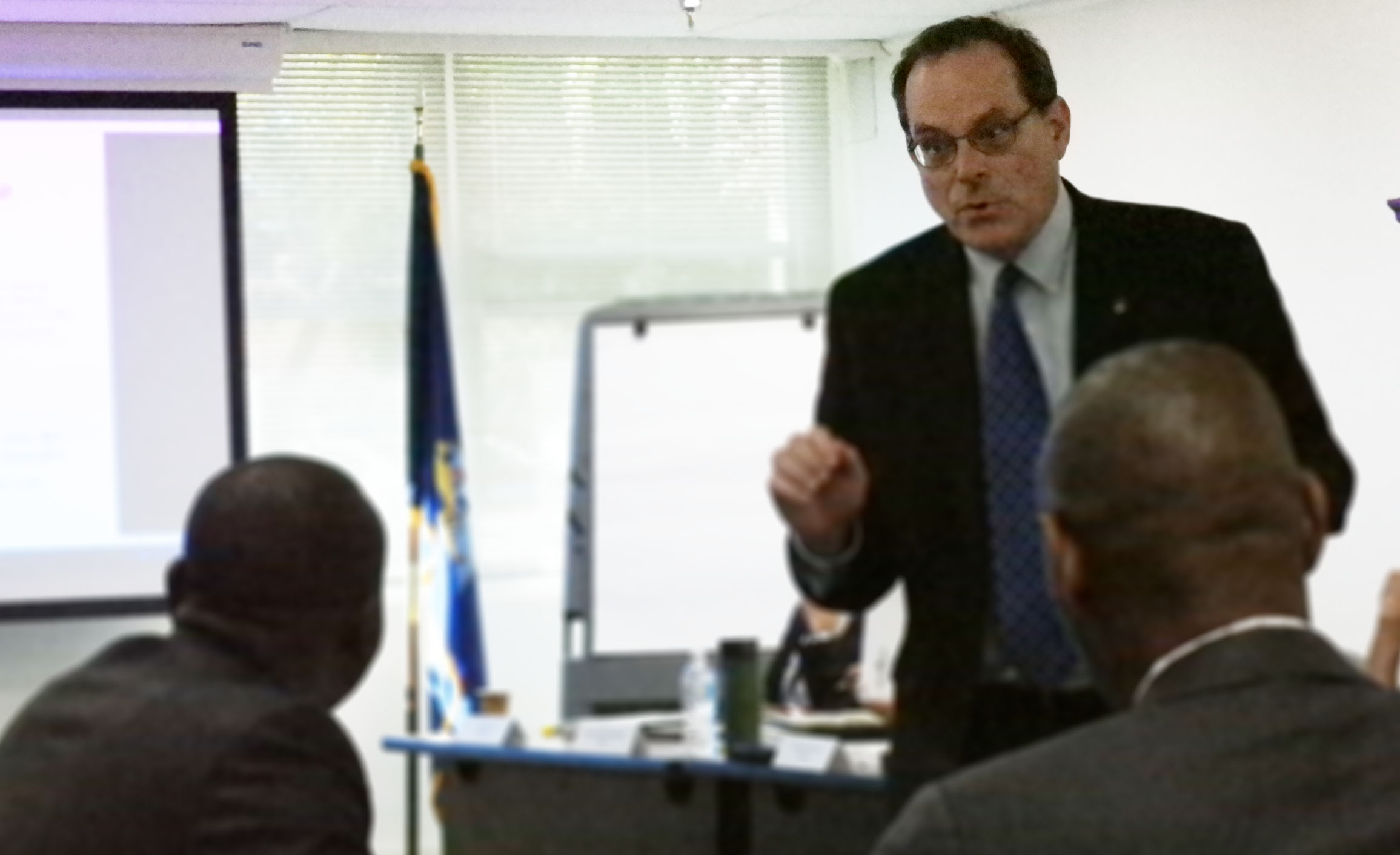
ISG has also begun to look in earnest at complimentary, distributed ways to engage with partners and allies. Kathleen Peggar, lead for International Defense Acquisition and Resource Management (IDARM) curricula, heads up a working group dedicated to exploring alternative delivery methods. According to her, there is “broad consensus that conducting activities virtually including using distributed learning is not a direct substitute for in-person learning.” Rather, these approaches have potential to supplement and reinforce existing ISG efforts, as well as offer new and different opportunities to support the ISG mission. To assist with this important task, Kathleen’s team has forged a cooperative relationship with the learning experience coordinators and instructional design professionals at the Naval Postgraduate School’s Graduate Education Advancement Center, Teaching and Learning Commons. This collaboration is in the nascent stages of designing and developing a two distributed learning experiences, which ISG may pilot later this year.
On a more personal note, like a number of ISG faculty, Kathleen works remotely from her home office. Doing so fulltime has given her a lot of virtual workaday experience. Owing to this familiarity, she’s noticed a marked difference in the way her colleagues interact virtually now as compared with before the broad adoption of situational telework under COVID-19. “I perceive a little more ‘giving grace’ with regard to my cat walking across the keyboard or my six-year-old popping up to ask for something.” Rationalizing, she goes on to explain, “Because we are all facing some similar types of challenges —many of our kids are not returning to the classrooms in the fall or our spouses are also working from home, etcetera — people are more willing to laugh off these blunders and drive on with the task at hand.”
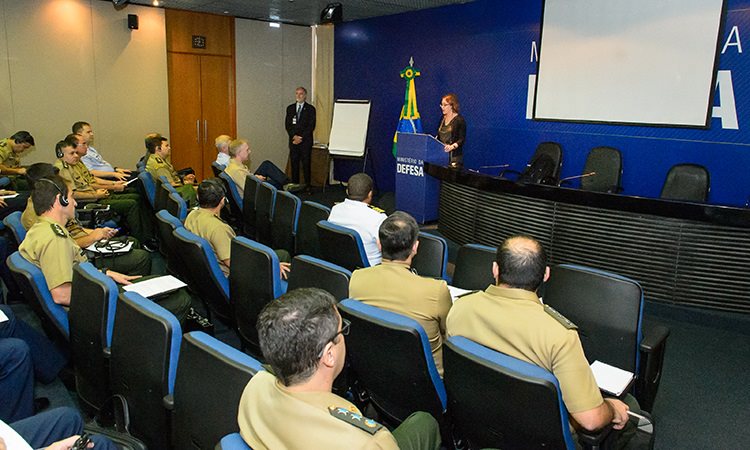
That is certainly the case for ISG’s three-person communications team, which went from sharing one office that included a wall of spontaneous sticky notes and original oil paintings, to pushing online collaboration apps to their very limits to get the job done. With ISG faculty associate Ellen Shipitalo at the helm, the “comms” team has been ceaseless in their commitment to articulating the mission, vision, partners, and people of ISG. Over the past few months this group of resourceful, hardworking professionals has built the website you are on right now. On behalf of all of ISG, I hope you enjoy it, stick around to get to know the Institute better, but, most of all, stay safe out there.
